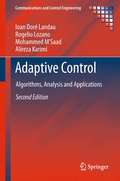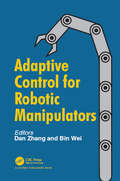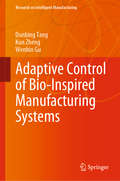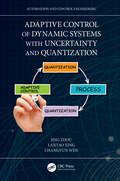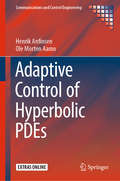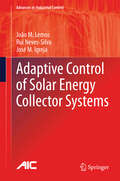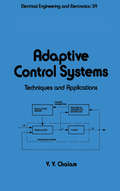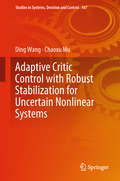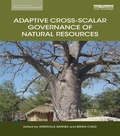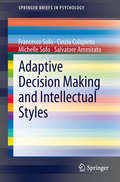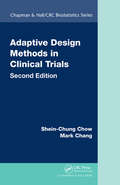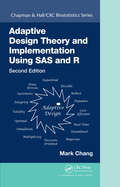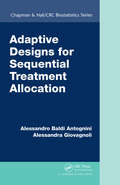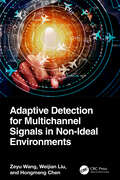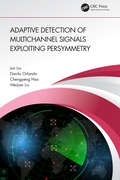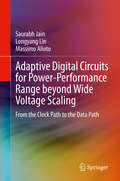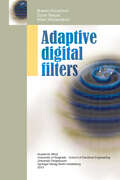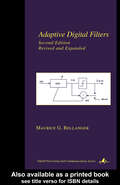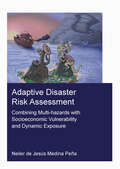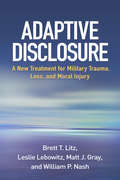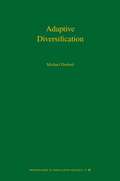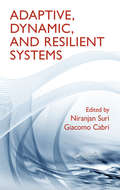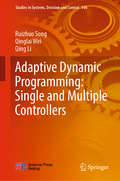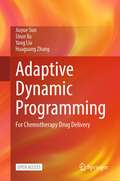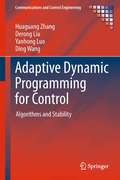- Table View
- List View
Adaptive Control: Algorithms, Analysis and Applications (Communications and Control Engineering)
by Mohammed M'Saad Rogelio Lozano Ioan Doré Landau Alireza KarimiAdaptive Control (second edition) shows how a desired level of system performance can be maintained automatically and in real time, even when process or disturbance parameters are unknown and variable. It is a coherent exposition of the many aspects of this field, setting out the problems to be addressed and moving on to solutions, their practical significance and their application. Discrete-time aspects of adaptive control are emphasized to reflect the importance of digital computers in the application of the ideas presented. The second edition is thoroughly revised to throw light on recent developments in theory and applications with new chapters on: multimodel adaptive control with switching, direct and indirect adaptive regulation and adaptive feedforward disturbance compensation. Many algorithms are newly presented in MATLAB® m-file format to facilitate their employment in real systems. Classroom-tested slides for instructors to use in teaching this material are also now provided. All of this supplementary electronic material can be downloaded from fill in URL. The core material is also up-dated and re-edited to keep its perspective in line with modern ideas and more closely to associate algorithms with their applications giving the reader a solid grounding in: synthesis and analysis of parameter adaptation algorithms, recursive plant model identification in open and closed loop, robust digital control for adaptive control; * robust parameter adaptation algorithms, practical considerations and applications, including flexible transmission systems, active vibration control and broadband disturbance rejection and a supplementary introduction on hot dip galvanizing and a phosphate drying furnace. Control researchers and applied mathematicians will find Adaptive Control of significant and enduring interest and its use of example and application will appeal to practitioners working with unknown- and variable-parameter plant. Praise for the first edition: ...well written, interesting and easy to follow, so that it constitutes a valuable addition to the monographies in adaptive control for discrete-time linear systems... suitable (at least in part) for use in graduate courses in adaptive control.
Adaptive Control for Robotic Manipulators
by Dan Zhang Bin WeiThe robotic mechanism and its controller make a complete system. As the robotic mechanism is reconfigured, the control system has to be adapted accordingly. The need for the reconfiguration usually arises from the changing functional requirements. This book will focus on the adaptive control of robotic manipulators to address the changed conditions. The aim of the book is to summarise and introduce the state-of-the-art technologies in the field of adaptive control of robotic manipulators in order to improve the methodologies on the adaptive control of robotic manipulators. Advances made in the past decades are described in the book, including adaptive control theories and design, and application of adaptive control to robotic manipulators.
Adaptive Control of Bio-Inspired Manufacturing Systems (Research on Intelligent Manufacturing)
by Dunbing Tang Kun Zheng Wenbin GuThis book introduces state-of-the-art models and methods based on the neuroendocrine-immune-inspired approaches in the field of manufacturing control systems. It develops various bio-inspired intelligent approaches for multiple applications in order to efficiently generate production plans and control solutions and agilely deal with the frequent unexpected disturbances at the shop floor level. It also provides an introduction to bio-inspired manufacturing systems with intelligent control structures and the latest technologies. Further, the book describes recent advances in the bio-inspired methodology for a high-level adaptability in manufacturing systems, including the bio-inspired control architecture and the implementation of intelligent and adaptive control approaches based on neuroendocrine-immune mechanisms and hormone-regulation principles. It offers a valuable resource for graduate students, researchers and engineers in the fields of production management, manufacturing system control and related areas.
Adaptive Control of Dynamic Systems with Uncertainty and Quantization (Automation and Control Engineering)
by Jing Zhou Lantao Xing Changyun WenThis book presents a series of innovative technologies and research results on adaptive control of dynamic systems with quantization, uncertainty, and nonlinearity, including the theoretical success and practical development such as the approaches for stability analysis, the compensation of quantization, the treatment of subsystem interactions, and the improvement of system tracking and transient performance. Novel solutions by adopting backstepping design tools to a number of hotspots and challenging problems in the area of adaptive control are provided. In the first three chapters, the general design procedures and stability analysis of backstepping controllers and the basic descriptions and properties of quantizers are introduced as preliminary knowledge for this book. In the remainder of this book, adaptive control schemes are introduced to compensate for the effects of input quantization, state quantization, both input and state/output quantization for uncertain nonlinear systems and are applied to helicopter systems and DC Microgrid. Discussion remarks are provided in each chapter highlighting new approaches and contributions to emphasize the novelty of the presented design and analysis methods. Simulation results are also given in each chapter to show the effectiveness of these methods. This book is helpful to learn and understand the fundamental backstepping schemes for state feedback control and output feedback control. It can be used as a reference book or a textbook on adaptive quantized control for students with some background in feedback control systems. Researchers, graduate students, and engineers in the fields of control, information, and communication, electrical engineering, mechanical engineering, computer science, and others will benefit from this book.
Adaptive Control of Hyperbolic PDEs (Communications and Control Engineering)
by Ole Morten Aamo Henrik AnfinsenAdaptive Control of Linear Hyperbolic PDEs provides a comprehensive treatment of adaptive control of linear hyperbolic systems, using the backstepping method. It develops adaptive control strategies for different combinations of measurements and actuators, as well as for a range of different combinations of parameter uncertainty. The book treats boundary control of systems of hyperbolic partial differential equations (PDEs) with uncertain parameters. <P><P> The authors develop designs for single equations, as well as any number of coupled equations. The designs are accompanied by mathematical proofs, which allow the reader to gain insight into the technical challenges associated with adaptive control of hyperbolic PDEs, and to get an overview of problems that are still open for further research. Although stabilization of unstable systems by boundary control and boundary sensing are the particular focus, state-feedback designs are also presented. The book also includes simulation examples with implementational details and graphical displays, to give readers an insight into the performance of the proposed control algorithms, as well as the computational details involved. A library of MATLAB® code supplies ready-to-use implementations of the control and estimation algorithms developed in the book, allowing readers to tailor controllers for cases of their particular interest with little effort. These implementations can be used for many different applications, including pipe flows, traffic flow, electrical power lines, and more. <P><P> Adaptive Control of Linear Hyperbolic PDEs is of value to researchers and practitioners in applied mathematics, engineering and physics; it contains a rich set of adaptive control designs, including mathematical proofs and simulation demonstrations. The book is also of interest to students looking to expand their knowledge of hyperbolic PDEs.
Adaptive Control of Solar Energy Collector Systems (Advances in Industrial Control)
by Rui Neves-Silva João M. Lemos José M. IgrejaThis book describes methods for adaptive control of distributed-collector solar fields: plants that collect solar energy and deliver it in thermal form. Controller design methods are presented that can overcome difficulties found in these type of plants: they are distributed-parameter systems, i. e. , systems with dynamics that depend on space as well as time; their dynamics is nonlinear, with a bilinear structure; there is a significant level of uncertainty in plant knowledge. Adaptive methods form the focus of the text because of the degree of uncertainty in the knowledge of plant dynamics. Parts of the text are devoted to design methods that assume only a very limited knowledge about the plant. Other parts detail methods that rely on knowledge of the dominant plant structure. These methods are more plant specific, but allow the improvement of performance. Adaptive Control of Solar Energy Collector Systems demonstrates the dynamics of solar fields to be rich enough to present a challenge to the control designer while, at the same time, simple enough to allow analytic work to be done, providing case studies on dynamics and nonlinear control design in a simple and revealing, but nontrivial way. The control approaches treated in this monograph can be generalized to apply to other plants modelled by hyperbolic partial differential equations, especially process plants in which transport phenomena occur, plants like dryers, steam super-heaters and even highway traffic. An important example, used repeatedly throughout the text, is a distributed-collector solar field installed at Plataforma Solar de Almeria, located in southern Spain. The control algorithms laid out in the text are illustrated with experimental results generated from this plant. Although the primary focus of this monograph is solar energy collector, the range of other systems which can benefit from the methods described will make it of interest to control engineers working in many industries as well as to academic control researchers interested in adaptive control and its applications.
Adaptive Control Systems: Techniques and Applications (Electrical And Computer Engineering Ser. #39)
by Chalamimpossible to access. It has been widely scattered in papers, reports, and proceedings ofsymposia, with different authors employing different symbols and terms. But now thereis a book that covers all aspects of this dynamic topic in a systematic manner.Featuring consistent terminology and compatible notation, and emphasizing unifiedstrategies, Adaptive Control Systems provides a comprehensive, integrated accountof basic concepts, analytical tools, algorithms, and a wide variety of application trendsand techniques.Adaptive Control Systems deals not only with the two principal approachesmodelreference adaptive control and self-tuning regulators-but also considers otheradaptive strategies involving variable structure systems, reduced order schemes, predictivecontrol, fuzzy logic, and more. In addition, it highlights a large number of practical applicationsin a range of fields from electrical to biomedical and aerospace engineering ...and includes coverage of industrial robots.The book identifies current trends in the development of adaptive control systems ...delineates areas for further research . : . and provides an invaluable bibliography of over1,200 references to the literature.The first authoritative reference in this important area of work, Adaptive ControlSystems is an essential information source for electrical and electronics, R&D,chemical, mechanical, aerospace, biomedical, metallurgical, marine, transportation, andpower plant engineers. It is also useful as a text in professional society seminars and inhousetraining programs for personnel involved with the control of complex systems, andfor graduate students engaged in the study of adaptive control systems.
Adaptive Critic Control with Robust Stabilization for Uncertain Nonlinear Systems (Studies in Systems, Decision and Control #167)
by Ding Wang Chaoxu MuThis book reports on the latest advances in adaptive critic control with robust stabilization for uncertain nonlinear systems. Covering the core theory, novel methods, and a number of typical industrial applications related to the robust adaptive critic control field, it develops a comprehensive framework of robust adaptive strategies, including theoretical analysis, algorithm design, simulation verification, and experimental results. As such, it is of interest to university researchers, graduate students, and engineers in the fields of automation, computer science, and electrical engineering wishing to learn about the fundamental principles, methods, algorithms, and applications in the field of robust adaptive critic control. In addition, it promotes the development of robust adaptive critic control approaches, and the construction of higher-level intelligent systems.
Adaptive Cross-scalar Governance of Natural Resources (Earthscan Studies in Natural Resource Management)
by Brian Child Grenville BarnesNatural resource governance is critical for linking poverty reduction and sustainable natural resource use. This book brings together authors from various disciplines with extensive field experience to promote an integrative understanding of cross-scale and adaptive governance in Africa and Latin America. The authors make the case for reaching beyond decentralization to promote adaptive governance that serves local priorities, but through interactions with local, district, national and global governance structures. The book focuses on the governance of common pool resources such as forests, wildlife, water, carbon and pasture resources in both Africa and Latin America. This book will appeal to development practitioners and scholars concerned about the conservation of natural resources and the sustainable development of communities. It synthesizes experience with the governance of different natural resources from a broad geographic perspective. It also provides theoretical and practical suggestions for taking adaptive natural resource governance forward, including participatory methods for measuring and monitoring governance.
Adaptive Decision Making and Intellectual Styles (SpringerBriefs in Psychology #13)
by Salvatore Ammirato Francesco Sofo Cinzia Colapinto Michelle SofoThis exciting publication provides the reader with a theoretical and practical approach to adaptive decision making, based on an appreciation of cognitive styles, in a cross-cultural context. The aim of this Brief is to describe the role of thinking-through different options as part of the decision-making process. Since cognitive style influences decision behavior, the book will first examine thinking styles, which involve both cognitive and emotive elements, as habits or preferences that shape and empower one's cognition and emotion. The information contained in this Brief will be a useful resource to both researchers studying decision making as well as to instructors in the higher education sector and to human resource development practitioners, especially those working in international, multi-cultural companies.
Adaptive Design Methods in Clinical Trials (Chapman & Hall/CRC Biostatistics Series)
by Shein-Chung Chow Mark ChangWith new statistical and scientific issues arising in adaptive clinical trial design, including the U.S. FDA's recent draft guidance, a new edition of one of the first books on the topic is needed. Adaptive Design Methods in Clinical Trials, Second Edition reflects recent developments and regulatory positions on the use of adaptive designs in clini
Adaptive Design Theory and Implementation Using SAS and R (Chapman & Hall/CRC Biostatistics Series)
by Mark ChangGet Up to Speed on Many Types of Adaptive DesignsSince the publication of the first edition, there have been remarkable advances in the methodology and application of adaptive trials. Incorporating many of these new developments, Adaptive Design Theory and Implementation Using SAS and R, Second Edition offers a detailed framework to understand the
Adaptive Designs for Sequential Treatment Allocation
by Alessandro Baldi Antognini Alessandra GiovagnoliAdaptive Designs for Sequential Treatment Allocation presents a rigorous theoretical treatment of the results and mathematical foundation of adaptive design theory. The book focuses on designing sequential randomized experiments to compare two or more treatments incorporating information accrued along the way. The authors first introduce the terminology and statistical models most commonly used in comparative experiments. They then illustrate biased coin and urn designs that only take into account past treatment allocations as well as designs that use past data, such as sequential maximum likelihood and various types of doubly adaptive designs. The book also covers multipurpose adaptive experiments involving utilitarian choices and ethical issues. It ends with adaptive methods that include covariates in the design. The appendices present basic tools of optimal design theory and address Bayesian adaptive designs.This book helps readers fully understand the theoretical properties behind various adaptive designs. Readers are then equipped to choose the best design for their experiment.
Adaptive Detection for Multichannel Signals in Non-Ideal Environments
by Weijian Liu Zeyu Wang Hongmeng ChenThis book systematically presents adaptive multichannel signal detection in three types of non-ideal environments, including sample-starved scenarios, signal mismatch scenarios, and noise plus subspace interference environments.The authors provide definitions of key concepts, detailed derivations of adaptive multichannel signal detectors, and specific examples for each non-ideal environment. In addition, the possible future trend of adaptive detection methods is discussed, as well as two further research points – namely, the adaptive detection algorithms based on information geometry, and the hybrid approaches that combine adaptive detection algorithms with machine learning algorithms.The book will be of interest to researchers, advanced undergraduates, and graduate students in sonar, radar signal processing, and communications engineering.
Adaptive Detection of Multichannel Signals Exploiting Persymmetry
by Jun Liu Danilo Orlando Chengpeng Hao Weijian LiuThis book offers a systematic presentation of persymmetric adaptive detection, including detector derivations and the definition of key concepts, followed by detailed discussion relating to theoretical underpinnings, design methodology, design considerations, and techniques enabling its practical implementation. The received data for modern radar systems are usually multichannel, namely, vector-valued, or even matrix-valued. Multichannel signal detection in Gaussian backgrounds is a fundamental problem for radar applications. With an overarching focus on persymmetric adaptive detectors, this book presents the mathematical models and design principles necessary for analyzing the behavior of each kind of persymmetric adaptive detector. Building upon that, it also introduces new design approaches and techniques that will guide engineering students as well as radar engineers toward efficient detector solutions, especially in challenging sample-starved environments where training data are limited. This book will be of interest to students, scholars, and engineers in the field of signal processing. It will be especially useful for those who have a solid background in statistical signal processing, multivariate statistical analysis, matrix theory, and mathematical analysis.
Adaptive Digital Circuits for Power-Performance Range beyond Wide Voltage Scaling: From the Clock Path to the Data Path
by Massimo Alioto Saurabh Jain Longyang LinThis book offers the first comprehensive coverage of digital design techniques to expand the power-performance tradeoff well beyond that allowed by conventional wide voltage scaling. Compared to conventional fixed designs, the approach described in this book makes digital circuits more versatile and adaptive, allowing simultaneous optimization at both ends of the power-performance spectrum. Drop-in solutions for fully automated and low-effort design based on commercial CAD tools are discussed extensively for processors, accelerators and on-chip memories, and are applicable to prominent applications (e.g., IoT, AI, wearables, biomedical). Through the higher power-performance versatility techniques described in this book, readers are enabled to reduce the design effort through reuse of the same digital design instance, across a wide range of applications. All concepts the authors discuss are demonstrated by dedicated testchip designs and experimental results. To make the results immediately usable by the reader, all the scripts necessary to create automated design flows based on commercial tools are provided and explained.
Adaptive Digital Filters
by Zoran Banjac Milan Milosavljević Branko Kovačević"Adaptive Digital Filters" presents an important discipline applied to the domain of speech processing. The book first makes the reader acquainted with the basic terms of filtering and adaptive filtering, before introducing the field of advanced modern algorithms, some of which are contributed by the authors themselves. Working in the field of adaptive signal processing requires the use of complex mathematical tools. The book offers a detailed presentation of the mathematical models that is clear and consistent, an approach that allows everyone with a college level of mathematics knowledge to successfully follow the mathematical derivations and descriptions of algorithms. The algorithms are presented in flow charts, which facilitates their practical implementation. The book presents many experimental results and treats the aspects of practical application of adaptive filtering in real systems, making it a valuable resource for both undergraduate and graduate students, and for all others interested in mastering this important field.
Adaptive Digital Filters (Signal Processing and Communications)
by Maurice BellangerThis text emphasizes the intricate relationship between adaptive filtering and signal analysis - highlighting stochastic processes, signal representations and properties, analytical tools, and implementation methods. This second edition includes new chapters on adaptive techniques in communications and rotation-based algorithms. It provides practical applications in information, estimation, and circuit theories.
Adaptive Disaster Risk Assessment: Combining Multi-Hazards with Socioeconomic Vulnerability and Dynamic Exposure (IHE Delft PhD Thesis Series)
by Neiler Medina PenaClimate change, combined with the rapid and often unplanned urbanisation trends, is associated with a rising trend in the frequency and severity of disasters triggered by natural hazards. In order to face the impacts of such threats, it is necessary to have an appropriate Disaster Risk Assessment (DRA). Traditional DRA approaches for disaster risk reduction (DRR) have focused mainly on the hazard component of risk, with little attention to the vulnerability and the exposure components. To address this issue, this dissertation’s main objective is to develop and test a disaster risk modelling framework that incorporates socioeconomic vulnerability and the adaptive nature of exposure associated with human behaviour in extreme hydro-meteorological events in the context of SIDS. To achieve the objective, an Adaptive Disaster Risk Assessment (ADRA) framework is proposed. ADRA uses an index-based approach (PeVI) to assess the socioeconomic vulnerability using three components: susceptibility, lack of coping capacities, and lack of adaptation. Furthermore, ADRA explicitly incorporates the exposure component using two approaches; first, a logistic regression model was built using the actual evacuation rates observed during Hurricane Irma, and second, an Agent-based model is used to simulate how households change their exposure levels in relation to different sources of information
Adaptive Disclosure: A New Treatment for Military Trauma, Loss, and Moral Injury
by William P. Nash Matt J. Gray Leslie Lebowitz Brett T. LitzA complete guide to an innovative, research-based brief treatment specifically developed for service members and veterans, this book combines clinical wisdom and in-depth knowledge of military culture. <P><P>Adaptive disclosure is designed to help those struggling in the aftermath of traumatic war-zone experiences, including life threat, traumatic loss, and moral injury, the violation of closely held beliefs or codes. Detailed guidelines are provided for assessing clients and delivering individualized interventions that integrate emotion-focused experiential strategies with elements of cognitive-behavioral therapy (CBT). Reproducible handouts can be downloaded and printed in a convenient 8 1/2" x 11" size.
Adaptive Diversification (Monographs in Population Biology #48)
by Michael DoebeliUnderstanding the mechanisms driving biological diversity remains a central problem in ecology and evolutionary biology. Traditional explanations assume that differences in selection pressures lead to different adaptations in geographically separated locations. This book takes a different approach and explores adaptive diversification--diversification rooted in ecological interactions and frequency-dependent selection. In any ecosystem, birth and death rates of individuals are affected by interactions with other individuals. What is an advantageous phenotype therefore depends on the phenotype of other individuals, and it may often be best to be ecologically different from the majority phenotype. Such rare-type advantage is a hallmark of frequency-dependent selection and opens the scope for processes of diversification that require ecological contact rather than geographical isolation. Michael Doebeli investigates adaptive diversification using the mathematical framework of adaptive dynamics. Evolutionary branching is a paradigmatic feature of adaptive dynamics that serves as a basic metaphor for adaptive diversification, and Doebeli explores the scope of evolutionary branching in many different ecological scenarios, including models of coevolution, cooperation, and cultural evolution. He also uses alternative modeling approaches. Stochastic, individual-based models are particularly useful for studying adaptive speciation in sexual populations, and partial differential equation models confirm the pervasiveness of adaptive diversification. Showing that frequency-dependent interactions are an important driver of biological diversity, Adaptive Diversification provides a comprehensive theoretical treatment of adaptive diversification.
Adaptive, Dynamic, and Resilient Systems
by Niranjan Suri Giacomo CabriAs the complexity of today's networked computer systems grows, they become increasingly difficult to understand, predict, and control. Addressing these challenges requires new approaches to building these systems. Adaptive, Dynamic, and Resilient Systems supplies readers with various perspectives of the critical infrastructure that systems of netwo
Adaptive Dynamic Programming: Single and Multiple Controllers (Studies in Systems, Decision and Control #166)
by Ruizhuo Song Qinglai Wei Qing LiThis book presents a class of novel optimal control methods and games schemes based on adaptive dynamic programming techniques. For systems with one control input, the ADP-based optimal control is designed for different objectives, while for systems with multi-players, the optimal control inputs are proposed based on games. In order to verify the effectiveness of the proposed methods, the book analyzes the properties of the adaptive dynamic programming methods, including convergence of the iterative value functions and the stability of the system under the iterative control laws. Further, to substantiate the mathematical analysis, it presents various application examples, which provide reference to real-world practices.
Adaptive Dynamic Programming: For Chemotherapy Drug Delivery
by Jiayue Sun Shun Xu Yang Liu Huaguang ZhangThis open access book focuses on the practical application of Adaptive Dynamic Programming (ADP) in chemotherapy drug delivery, taking into account clinical variables and real-time data. ADP's ability to adapt to changing conditions and make optimal decisions in complex and uncertain situations makes it a valuable tool in addressing pressing challenges in healthcare and other fields. As optimization technology evolves, we can expect to see even more sophisticated and powerful solutions emerge.
Adaptive Dynamic Programming for Control: Algorithms and Stability (Communications and Control Engineering)
by Yanhong Luo Huaguang Zhang Ding Wang Derong LiuThere are many methods of stable controller design for nonlinear systems. In seeking to go beyond the minimum requirement of stability, Adaptive Dynamic Programming in Discrete Time approaches the challenging topic of optimal control for nonlinear systems using the tools of adaptive dynamic programming (ADP). The range of systems treated is extensive; affine, switched, singularly perturbed and time-delay nonlinear systems are discussed as are the uses of neural networks and techniques of value and policy iteration. The text features three main aspects of ADP in which the methods proposed for stabilization and for tracking and games benefit from the incorporation of optimal control methods: * infinite-horizon control for which the difficulty of solving partial differential Hamilton-Jacobi-Bellman equations directly is overcome, and proof provided that the iterative value function updating sequence converges to the infimum of all the value functions obtained by admissible control law sequences; * finite-horizon control, implemented in discrete-time nonlinear systems showing the reader how to obtain suboptimal control solutions within a fixed number of control steps and with results more easily applied in real systems than those usually gained from infinite-horizon control; * nonlinear games for which a pair of mixed optimal policies are derived for solving games both when the saddle point does not exist, and, when it does, avoiding the existence conditions of the saddle point. Non-zero-sum games are studied in the context of a single network scheme in which policies are obtained guaranteeing system stability and minimizing the individual performance function yielding a Nash equilibrium. In order to make the coverage suitable for the student as well as for the expert reader, Adaptive Dynamic Programming in Discrete Time: * establishes the fundamental theory involved clearly with each chapter devoted to a clearly identifiable control paradigm; * demonstrates convergence proofs of the ADP algorithms to deepen understanding of the derivation of stability and convergence with the iterative computational methods used; and * shows how ADP methods can be put to use both in simulation and in real applications. This text will be of considerable interest to researchers interested in optimal control and its applications in operations research, applied mathematics computational intelligence and engineering. Graduate students working in control and operations research will also find the ideas presented here to be a source of powerful methods for furthering their study.
